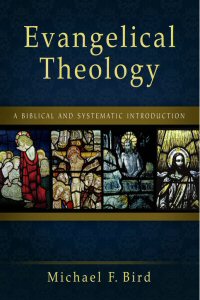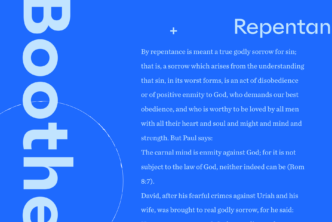
For a limited time get $8.00 off Evangelical Theology with coupon code BIRD14, and let us know what you think of the book!
What responses have you received to Evangelical Theology?
For the most part very positive. People have liked an approach to theology that makes the gospel the beginning, center, and integrating theme. It resonates with the evangelical ethos and missional direction of many churches. People have also liked the decision to turn the gospel into an interpretive lens through which the various loci of theology are understood. Even in places where there has been criticism, some reviewers have acknowledged the validity of the approach, though they are critical on points of its precise execution.
For those who have not yet read your book, why should they read it?
There are a lot of good theology books out there, and there are several good ones to choose from (e.g., Erickson, Horton, Bray, Grudem, Migliore, etc.). What makes my Evangelical Theology distinct is that it is the attempt—however successful—to develop a consistently evangelical theology where the evangel, the good news about Jesus Christ, really drives the structure, content, method, and approach of theology. I also have this idea that theology is about “gospelizing,” whereby the goal of theology is to conform us to the shape and power of the gospel. When you magnetize a piece of metal it becomes magnetic. When you sterilize a surgical tool it becomes sterile. So when you are gospelized you begin to express and experience the grace of the gospel in your life, work, preaching, ministry, and prayer, so that you ooze gospel as a person. I want to see people gospelized.
Evangelical Theology takes a different layout than the typical 10-doctrine format. Can you explain why you chose to go that route?
I do a few things a little differently. I don’t start with the doctrine of Scripture. Rather, I start by defining the gospel, what it is and why it matters. Thereafter I do the doctrine of the “God of the gospel” with special reference to the self-revelation of the God who is Trinity. Next—and this weirds people out a bit—I do the “gospel of the kingdom” and launch into eschatology. Eschatology is not an epilogue at the end of a theology; rather, eschatology pervades our theology at every point: church, ethics, work of Christ, doctrine of God—these all must be understood in light of God’s invasive act to reconcile the world through Jesus, its now and not yet moment. So that has caused a few folks to go, “hmm” or “hmpf.”
In the section titled “Marks of the Church” you structure your thoughts according to the Nicene Creed. How do you see the traditional creeds impacting Modern Christianity? Do you feel Evangelical Protestants are abnormally opposed to a creedal model when compared to the broader international church?
I think our churches need to see themselves as part of a broader tradition that is “catholic.” Sadly, Evangelical Protestants have defined themselves over and against Roman Catholicism. So you sometimes get the impression that the Roman Catholic church was never a church and that everything Roman Catholic is bad. However, the Reformation was about reforming the Roman Catholic church to bring it back to its apostolic roots. It was not a denial of the apostolic roots of the Roman Catholic church, nor was it attempting to create a religious group that was only vaguely related to the past. I think a great source of renewal for evangelical churches will come about by developing what folks are calling a Reformational Catholicism. By “Reformational Catholicism” I mean holding to the main tenets of the Reformation, but also recapturing those things of our “catholic” heritage that we’ve neglected, like the Trinity, the importance of the physical presence of the church, the wisdom of the church fathers, creeds as summarizing biblical faith, the Lord’s Supper and Baptism as a means of grace, and the like.
How do you envision your book being used as a textbook in seminaries and bible colleges?
It’s my sincere hope that Evangelical Theology will prove to be useful to teachers and students as a way—though not the only way—of enabling people to have an evangelical faith seeking missional understanding. I hope that this book contributes to the spiritual formation, ministerial development, and theological maturity of as many as use it.
Discover a new and exciting perspective on theology. Get Bird’s Evangelical Theology and save $8.00 off the regular price with coupon code BIRD14. Get your copy today.





